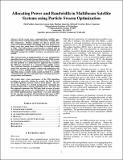| dc.contributor.author | Pachler, Nils | |
| dc.contributor.author | Luis, Juan Jose Garau | |
| dc.contributor.author | Guerster, Markus | |
| dc.contributor.author | Crawley, Edward | |
| dc.contributor.author | Cameron, Bruce | |
| dc.date.accessioned | 2021-11-03T18:14:19Z | |
| dc.date.available | 2021-11-03T18:14:19Z | |
| dc.date.issued | 2020-03 | |
| dc.identifier.uri | https://hdl.handle.net/1721.1/137284 | |
| dc.description.abstract | © 2020 IEEE. In recent years, communications satellites' payloads have been evolving from static to highly flexible components. Modern satellites are able to provide four orders of magnitude higher throughput than their predecessors forty years ago, going from a few Mbps to several hundreds of Gbps. This enhancement in performance is aligned with an increasing highly-variable demand. In order to dynamically and efficiently manage the satellite's resources, an automatic tool is needed. This work presents an implementation of a new metaheuristic algorithm based on Particle Swarm Optimization (PSO) to solve the joint power and bandwidth allocation problem. We formulate this problem as a multi-objective approach that considers the different constraints of a communication satellite system. The evaluation function corresponds to a full-RF link budget model that accounts for adaptive coding and modulation techniques as well as multiple types of losses. We benchmark the algorithm using a realistic traffic model provided by a satellite communications operator and under time restrictions present in an operational environment. The results show a fast convergence of the PSO algorithm, reaching an admissible solution in seconds. However, the PSO tends to get stuck in local optima and often fails to reach the global optimum. This motivates the creation of a hybrid metaheuristic combining the presented PSO with a Genetic Algorithm (GA). We show that this approach dominates the PSO-only both in terms of power consumption and service rate. Furthermore, we also show that the hybrid implementation outperforms a GA-only algorithm for low run-time executions (10-second executions). The hybrid provides up to an 85% power reduction and up to 10% better service rate in this case. | en_US |
| dc.language.iso | en | |
| dc.publisher | IEEE | en_US |
| dc.relation.isversionof | 10.1109/aero47225.2020.9172694 | en_US |
| dc.rights | Creative Commons Attribution-Noncommercial-Share Alike | en_US |
| dc.rights.uri | http://creativecommons.org/licenses/by-nc-sa/4.0/ | en_US |
| dc.source | Other repository | en_US |
| dc.title | Allocating Power and Bandwidth in Multibeam Satellite Systems using Particle Swarm Optimization | en_US |
| dc.type | Article | en_US |
| dc.identifier.citation | Pachler, Nils, Luis, Juan Jose Garau, Guerster, Markus, Crawley, Edward and Cameron, Bruce. 2020. "Allocating Power and Bandwidth in Multibeam Satellite Systems using Particle Swarm Optimization." IEEE Aerospace Conference Proceedings. | |
| dc.contributor.department | Massachusetts Institute of Technology. Department of Aeronautics and Astronautics | |
| dc.relation.journal | IEEE Aerospace Conference Proceedings | en_US |
| dc.eprint.version | Author's final manuscript | en_US |
| dc.type.uri | http://purl.org/eprint/type/ConferencePaper | en_US |
| eprint.status | http://purl.org/eprint/status/NonPeerReviewed | en_US |
| dc.date.updated | 2021-04-22T17:51:49Z | |
| dspace.orderedauthors | Pachler, N; Luis, JJG; Guerster, M; Crawley, E; Cameron, B | en_US |
| dspace.date.submission | 2021-04-22T17:51:50Z | |
| mit.license | OPEN_ACCESS_POLICY | |
| mit.metadata.status | Authority Work and Publication Information Needed | en_US |
